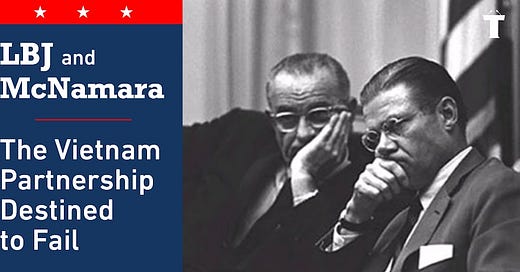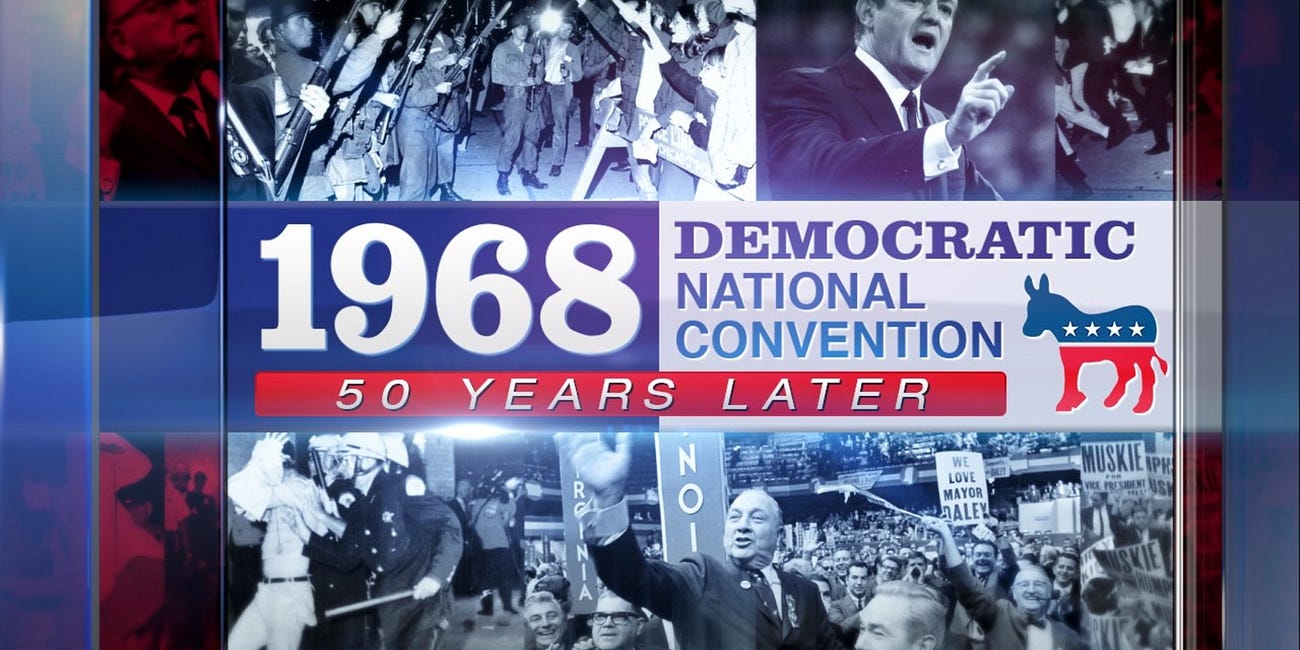The spring and summer of the 1964 election year moved on two tracks, which was to be the historical paradox of Lyndon Johnson’s presidency: Vietnam, where Johnson was flailing; and his domestic “Great Society,” ambitions that were a genuine, deeply felt priority.
“Amid all this uncertainty and frustrating confusion, I made an impulsive and ill- considered public statement that has dogged me ever since,” Robert McNamara writes in a particularly revealing passage in his memoir. At a Pentagon briefing on April 24, this was the answer when a reporter said that Senator Wayne Morse of Oregon, a staunch critic of the administration’s Vietnam policy, had called the conflict “McNamara’s war.”
“I am following the President’s policy,” McNamara responded. “…I must say [in that sense] I don’t object to its being called McNamara’s War. I think it is a very important war and I am pleased to be identified with it and do whatever I can to win it.”
Less than a week later, talking to Johnson, McNamara’s tone was altogether different. LBJ asked, “Have we got anybody that’s got a military mind that can give us some military plans for winning that war?” McNamara mentioned General Earle (Bus) Wheeler, who would be appointed chairman of the Joint Chiefs of Staff in July to replace Maxwell Taylor, who was being sent to South Vietnam to replace Henry Cabot Lodge as U.S. ambassador, all meant to shore up the “mess” in Saigon, as it was being called in any number of private conversations.
LBJ said that in Wheeler’s recent trip to Vietnam, “he came back with planes, that’s all he had in mind…”
McNamara replied: “Well, uh, yes we had more than that, but he emphasized planes…”
LBJ: “Let’s get more of something, my friend, because I’m going to have a heart attack if you don’t get me something. I’m just sitting here every day and, uh, and this war…I’m not doing much about fightin’ it and, uh, I’m not doing much about winnin’ it…Let’s get somebody that wants to do something besides drop a bomb, but go in and take these damn fellas and run them back where they belong…”
But when U.S, combat options were put forward, Johnson rejected them, and his advisers couldn’t put forward any coherent alternatives.
On May 22, in a commencement speech at the University of Michigan, Johnson framed his vision as a “Great Society” to “enrich and elevate our national life.” The goal – an affirmation of the highest aspirations of the Declaration of Independence – was to eradicate poverty, inequality, and injustice.
“But most of all,” Johnson said, as his rhetoric soared, “the Great Society is not a safe harbor, a resting place, a final objective, a finished work. It is a challenge constantly renewed, beckoning us toward a destiny where the meaning of our lives matches the marvelous products of our labor.”
It may well have been impossible to reconcile these two tracks. Facing the reality in Vietnam, as McNamara came to believe, would mean accepting JFK’s ingrained belief that unless the South Vietnamese could demonstrate their own capacity to prevail politically and militarily, the U.S. could not do it for them. Yet in 1964, stating this unequivocally was never going to happen.
The U.S. had departed, in McNamara’s words, from the “fundamental principles that Kennedy had premised our intervention on without recognizing ourselves that we departed from them.” And so the Johnson administration was inexorably overtaken by events and the continuing contention that withdrawal or neutralization – as President Charles de Gaulle of France was advocating – would be considered unacceptable defeat.
When the decision was made to replace Lodge in Saigon, McNamara volunteered for the job. Johnson did not consider this, but at one point, the president asked McNamara if he would agree to serve as vice president on the 1964 ticket. “Knowing President Johnson as I did,” McNamara writes, “I knew that if I answered yes, he might later reconsider and withdraw the invitation. In any event, I said no.”
Over the summer, Johnson said he wanted McNamara to be his “number one executive vice president in charge of the Cabinet” in the next term.
In words private and public, LBJ and McNamara were to be inextricable going forward in how the war would be perceived.
*************************
In the decade of America’s Vietnam war, there were pivotal events that forecast the outcome. The November 1963 coup against Diem and Nhu and the political chaos that followed was certainly one such event. The Tonkin Gulf incidents of August 1964 were another. While minimal in actual warfare they became the baseline for what would transpire thereafter.
The details of the Tonkin Gulf incidents of late July and early August 1964 are straightforward enough. A covert South Vietnamese operation codenamed Plan 34A involved the infiltration of South Vietnamese agents with radios into the north and the use of hit-and-run attacks on North Vietnamese shore and island installations – in other words, a minor but direct assault on the North. The CIA supported these operations, and the U.S. military kept track of them.
The U.S. deployed patrols in the region (known as DESOTO patrols) as part of a global reconnaissance operation using specially equipped naval vessels to collect information that might be useful in any military confrontation with adversaries. Plan 34A and DESOTO were entirely separate. McNamara writes, “Most of the South Vietnamese agents sent into North Vietnam were either captured or killed, and the seaborne attacks amounted to little more than pinpricks…The South Vietnamese government saw them as a relatively low-cost means of harassing North Vietnam.”
On August 2, the two operations intersected when the U.S. destroyer Maddox, on DESOTO patrol, came into contact with North Vietnamese vessels firing torpedoes and automatic weapons – Hanoi’s retaliation for the Plan 34A activities a few days before. It was a summer weekend and, as he said, McNamara was in Newport visiting Jackie Kennedy. McGeorge Bundy was on Martha’s Vineyard doing what LBJ derisively described as “playing tennis at the female island.”
The U.S. had sanctioned Plan 34A, so the North Vietnamese assault on the Maddox was not really unprovoked.
“Well,” said Johnson, “it reminds me of the movies in Texas. You’re sitting next to a pretty girl, and you have your hand on her ankle, and nothing happens. And you move it up to her knee and nothing happens. And you move it up further and you’re thinking about moving a bit more and all of a sudden you get slapped. I think we got slapped.”
With that earthy quip, Johnson concluded that the episode was not a pretext for a military response – although it was later made clear that the attack on the Maddox had been ordered in Hanoi. A note of protest was sent to Hanoi asserting that the incident had been “unprovoked,” even though Plan 34A was in fact a provocation while DESOTO was technically not one.
On August 4, the Maddox returned to the Gulf of Tonkin accompanied by another U.S. destroyer, the USS Turner Joy. In Washington that morning, the Maddox reported that it was preparing for an imminent attack on a cloudy night with thunderstorms. The transcripts of radio traffic that night reveal (to keep a confusing point as simple as possible) and what history has concluded is that no actual attack on the U.S. ships ever took place, although they might have. Being unresolved, the consensus has become that the episode was a misrepresentation of the facts, which in the overall saga was considered deliberate deception rather than confusion.
What makes that judgment significant is that the Tonkin Gulf Resolution the administration put forward, which was passed unanimously by the House and 88-2 by the Senate on August 7, gave LBJ enormous power to pursue his objectives in Vietnam. It is also clear that no one anticipated that the authority approved after a minor incident in offshore waters would morph into a half-million American combat troops and a sustained bombing campaign that would go on for years.
Johnson’s political strategy for 1964 was vindicated by his sweeping victory over Barry Goldwater in the general election. He continued to stress moderation in his public statements and American “moral” purpose in helping the “weak defend their freedom.”
Yet whenever he gathered his military and political advisers, proposals went round and round without reaching tactical outcomes that could be implemented.
McNamara told his editors assessing what he wanted to say about that period:
“The Chiefs were much more divided than anybody understood and …there was a distinct failure – I don’t want to put it quite that bluntly, but there was a distinct failure of military leadership….
“There’s one place in here where I say, I failed…For fifty years, I’ve been a manager. For fifty years I dealt with organization. I know how to probe and penetrate and not accept things that are presented to me. I didn’t do it here. It’s my failure.”
So, at the end of Lyndon Johnson’s first year as president, with the mandate of leadership that he wanted so badly, the men who surrounded him were divided among themselves, whether always deliberately or not, misleading the public, exaggerating the prospect of Soviet or Chinese direct intervention in the war and about to launch the escalation that – they understood – was almost certainly hopeless.
Next Week: Part Nine: Fork in the Road
Lyndon Johnson’s decision to abandon the 1968 presidential election was the closest historical precedent for President Biden’s withdrawal. A remarkably, candid audio of McNamara discussing what led to the withdrawal with his editors in 1994 is at www.platformbooks.net.
And this piece, a guide to events of the moment.
If Donald Trump and/or Joe Biden Drop Out...
Will American voters go to the polls next November to choose between former President Donald Trump and President Joe Biden? As with so many others you and I know, I hope not. But unlike what pollsters contend is the majority of the populace, I don’t accept that this will happen. Why?
To read previous installments in this series go to www.platformbooksllc.net. There is an archive of earlier pieces and a link to sources, acknowledgements and the audio of McNamara working with his editors on his memoir.
The C-SPAN interview on “LBJ-McNamara-Partnership Destined to Fail” has been postponed until orginal programming resumes at that hour in September.








"The goal – an affirmation of the highest aspirations of the Declaration of Independence – was to eradicate poverty, inequality, and injustice."
That statement represents what has bifurcated America from our inception. The highest aspirations of the Declaration of Independence NOT to eradicate poverty, inequality, and injustice. One might argue that the eradication of injustice is one of them, but that begs the question, What is justice? It sought as everyone does to escape poverty, but it sought the right to pursue that goal, not to guarantee its accomplishment. Jefferson and most of the founders were well aware that inequality is inevitable to human beings. The sought to eliminate the government's ability to enforce inequality. Ever since then politicians have attempted, successfully, do protect their own superiority over as many as was possible.
We still haven't been able to agree on a definition of justice, nor of wealth, nor of equality. Our founders agreed amongst themselves to compromise on the question of all men, defining slaves as less that fully men--three-fifths of a man specifically. Americans were de facto less than human, to be killed, incarcerated, and otherwise belittled.